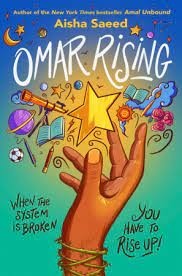In this compelling companion to New York Times bestseller Amal Unbound, Amal's friend Omar must contend with being treated like a second-class citizen when he gets a scholarship to an elite boarding school.
Omar knows his scholarship to Ghalib Academy Boarding School is a game changer, providing him—the son of a servant—with an opportunity to improve his station in life. He can't wait to experience all the school has to offer, especially science club and hopefully the soccer team; but when he arrives, his hopes are dashed.
First-year scholarship students aren't allowed to join clubs or teams—and not only that, they have to earn their keep doing menial chores. At first Omar is dejected—but then he gets angry when he learns something even worse—the school deliberately "weeds out" kids like him by requiring them to get significantly higher grades than kids who can pay tuition, making it nearly impossible for scholarship students to graduate. It's a good thing that in his favorite class, he’s learned the importance of being stubbornly optimistic. So with the help of his tightknit new group of friends—and with the threat of expulsion looming over him—he sets out to do what seems impossible: change a rigged system.---from the publisher
224 pages 978-0593108581 Ages 10-13
Keywords: school, school issues, diverse books, diversity, discrimination, friends, friendship, finding your voice, standing up for yourself, 10 year old, 11 year old, 12 year old, 13 year old
Note: Companion book to Amal Unbound
**************
Richie’s Picks: OMAR RISING by Aisha Saeed, Penguin Random House/Nancy Paulsen, February 2022, 224p., ISBN: 978-0-593-10868-1
“When you get so down that you can’t get up
And you want so much, but you’re all out of luck
When you’re so downhearted and misunderstood
Just over and over and over you go
Yeah, hold on tight to your dreams”
– Jeff Lynne (1981)
“‘How bad?’ I ask him.
‘Seventy-two. I can’t believe it,’ he says shakily. It’s almost a D.’
‘You did better than me,’ I say. ‘I actually did get a D.’
‘I didn’t even think the test was that hard,’ Naveed says in a tight voice. ‘How could we have done this badly? And Motz says we need to study harder. That’s not humanly possible.’
‘That’s the point,’ Faisal says.
‘What do you mean?’ I ask.
Faisal fixes his gaze down at the damp rag in his hand. ‘You haven’t figured it out yet?’ His easygoing demeanor is gone.
‘Figured what out?’ Naveed asks. He takes in Faisal’s somber expression and then the cook’s. He shrinks back. ‘You’re–you’re scaring me.’
Faisal hesitates, but then–
‘This is your weed-out year.’
‘Weed-out year?’ I repeat. What do you mean?’
Omar Ali, a twelve-year-old Pakistani schoolboy, becomes the pride of his rural village when he earns a scholarship to attend Chalib Academy, a prestigious boarding school. But after arriving there, he comes to understand that the scholarships are little more than a strategy employed in order to make the school look good.
The reality is that the scholarship students, like Omar, are treated unfairly. They are forbidden to participate in the rich variety of extracurriculars offered to the rest of the students. They must each spend an hour a day providing free labor, such as working in the kitchen or folding laundry. And then, an upper-grade scholarship student clues Omar into the fact that the administration expects scholarship students to maintain a near-impossible A+ average in order to avoid being “weeded out.”
Omar is a great student, but his Achilles heel is his English class. It is being taught by the school’s sullen headmaster/executioner, who had me recalling John Houseman in The Paper Chase.
The heavy-handed classism fostered by the school’s policies seems so backward and unfair, but what can be done about it? Omar and a couple of friends form a study group, and forgo most diversions, in order to do as well as they possibly can. But will these efforts be enough to meet the ridiculous grade requirement that only applies to the scholarship kids? Can anything be done to change the system?
As a long-ago student activist, this one definitely made me smile.
Recommended by: Richie Partington, MLIS, California
See more of Richie's Picks






